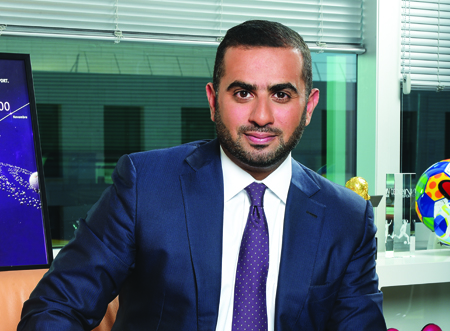beIN Media Group has been quietly acquiring MENA sports broadcast rights over the years. Last November, it took an ambitious step by announcing its entry into the entertainment space. In an exclusive interview with Vijaya Cherian, Yousef Al-Obaidly, Deputy CEO of beIN, reveals for the first time the pay TV networks MENA plans, its strategy […]

beIN Media Group has been quietly acquiring MENA sports broadcast rights over the years. Last November, it took an ambitious step by announcing its entry into the entertainment space. In an exclusive interview with Vijaya Cherian, Yousef Al-Obaidly, Deputy CEO of beIN, reveals for the first time the pay TV networks MENA plans, its strategy and its business model
What is beIN’s long-term vision?
beINs vision is to be the regions leading pay-TV platform that provides entertainment for the whole family. We want to be at the forefront of technology that enables customers to enjoy the great programming that we have in 1080P full HD with digital Dolby sound. We want to be the brand that is viewed as a one-stop premium entertainment destination.
A lot is said about beIN not being financially viable. Can you clarify the situation?
It is true that pay TV is a very capital-intensive industry. However, all over the world, in markets similar to where we operate, those companies that have focused on customers and persisted with high-quality exclusive content, while selling them at fair prices, have emerged as winners. We have seen various business models in the pay TV industry in the MENA as well. There are companies operating at the ultra-expensive end of the market and there are IPTV and OTT players operating on the other end of the value chain. beIN is positioning itself in the middle, where we feel the majority of the customers want to be.
We have a viable business plan and operation based on affordable price positioning. We feel that this will create enough traction with a very large segment of the population. Our focus is on revenue and subscriber growth. We have been and will continue to achieve it through constant focus on our programming, providing a great customer experience and undertaking aggressive marketing. Our business model is extremely viable and there are many successful examples of companies that have pursued similar strategies in other markets and have been successful, so I have no doubt that we will be as well. I dont agree with the notion that our business model is not financially viable.
On the contrary, I have immense confidence that for the MENA, this is the best business model. In my opinion, the winning formula is simple, i.e. best and exclusive content coupled with great technology and customer experience, aggressively marketed at the right price point.
What is the reason for your success in this market?
The reason beIN is so successful in the MENA region is because we are customer-focused. One of the main customer pain points in the region was that major football rights were spread over many pay-TV platforms. Slowly and steadily, we have consolidated all meaningful football rights into a single platform. Besides football, we have many other premium sports content, from tennis, athletics, rugby, basketball and so on. So if you are a sports fan, you just need one brand and one set-top box.
Consolidation of all premium sports programming within beIN has brought us very close to the predominantly young population of this region. Over the years, we have tried to serve even niche segments of the customer base we have. For instance, today we broadcast in English, French and Spanish, besides Arabic. English is relevant to a niche segment in only six to seven of the markets that we operate in, French is only relevant in five countries, and Spanish only in two or three. But if we want to position ourselves as the best sports broadcaster in the region, we have to serve these niche customers well. This requires investment and a customer-centric mind-set. Over the years, we have made these investments, and as a result, today we have a dominant position in this space.
On the other side, the rights owners want to align their brands with beIN because they have confidence in our ability to do justice to their brands from a marketing perspective as well as provide them with region-wide exposure. beIN is the only pay-TV brand that has a very meaningful presence in North Africa as well. So when rights owners look at beIN, they know that they are looking at the most compelling partner from within this region.
We feel we now have a comfortable position in sports. Our focus is now more on acquiring meaningful factual, kids, movies and series content. You will continue to get news of beINs expansion in this space throughout 2016 and beyond.
Can you share some solid figures on your subscribers and other statistics that convey your success in this market?
beIN is the largest pay-TV platform with regards to subscribers and revenues. For popular matches, our viewership touches around 80 million. We are the only pay-TV platform that truly operates in 24 markets in this region. We have almost 60 high-quality TV channels and we are planning to have around 100 before the end of 2016.
Why did beIN change its strategy from just sports to entering the entertainment space?
We regularly conduct customer research to identify growth opportunities. In one such exercise, we observed that our subscribers had high interest in movies (84%), series (61%) and documentaries (55%). Furthermore, the female segment also showed a high appetite for kids programming (88%) and lifestyle programming (71%). Our subscribers indicated that they would be more inclined to subscribing to entertainment content offered by beIN, as it would be safe for family viewing and in line with local customs and culture. Based on this insight, we embarked on the journey of establishing our entertainment bouquet. If you take a look at what we have acquired so far, it is in line with our strategy of developing an entertainment portfolio that focuses on the need of the complete family. We now have one of the best kids entertainment portfolios, great factual content and Hollywood movies that are safe for family viewing.
Do you think you will be able to migrate subscribers from existing pay-TV networks to your platform?
I think the pay-TV pie is big enough for multiple players. We have a different product compared to our competitors. Our unique selling proposition is our strength in the sports arena, coupled with great entertainment content being provided at a very reasonable price point.
We do not need to concentrate on any competitor, as everyone is unique and has their own strengths and weaknesses. For us, the prime focus is to attract the people who have not yet experimented with pay TV due to a high barrier to subscribe, i.e. high prices. So I am more focused on converting those who still have not subscribed to pay TV to experience beIN.
Pay-TV penetration in our region is below 20%, which compares extremely unfavourably with pay-TV penetration in Europe and the US. In the MENA, we are not at a stage where we can focus on smaller segments of other pay-TV subscribers yet. Another issue that I am more focused on is piracy. Pay-TV platforms lose millions of customers in this region to piracy. This is why we want to keep our price point at $10 for a basic package, so that people are incentivised to subscribe to pay TV.
By providing choice to customers, I am sure customers in the region will choose the best product that suits their needs. As a business, it is our job to understand our prospects well and provide them with the best product.
Can you elaborate on your business model?
Our business model is similar to that of any other pay-TV platform in the world. The majority of our revenue comes from subscription, followed by advertising, digital media and sub-licensing of rights. The success of our business model depends on how successful the subscription side of our business is. To make sure that we meet our targets, we actively collaborate with IPTV players in this region. However, our primary focus is direct-to-home (DTH). Within the DTH segment, we have two packages that are our mainstays, i.e. beIN Complete and beIN Top Sports. Another area of focus for us is how to control our churn. While we see a big number of subscribers coming in for mega events like Euro, World Cup, Classico, etc, it is critical for us that they stay on and keep enjoying our service. We have various initiatives in place to reduce our churn.
From a strategic perspective, we are extremely aggressive in acquiring valuable sports and entertainment content. We have made heavy investments in technology. We have one of the best studios and production facilities in the world. This investment has raised the standard of production and presentation in the region. As I mentioned earlier, we believe that prospects in this region can be converted into customers if you offer them a great product at a reasonable price. In a nutshell, this is what we are striving to achieve.
We hear you have several deals in the pipeline for entertainment?
Yes, we are in various stages of negotiation with different players. We have just signed a deal with a leading brand from the UK, which we will be announcing soon. On the other hand, we continue to strengthen our movies proposition, so expect to hear more news in this space. We are also focused on identifying great brands that are not available in this region so that we can collaborate with them and bring them to the MENA region.
How many channels do you expect to have by the end of this year? Give us an idea of the targets you are hoping to achieve this year in terms of deals, channels and subscribers.
We started 2016 with 41 channels, and this includes 22 sports channels, while the rest are in the entertainment and news space. In April, we will have close to 60 channels. I think that by the end of 2016, we will have around 100 high-quality channels with unique content that appeals to diverse segments of the population. We also want to be a comprehensive product offering that fulfils the needs of the whole family. I feel that we will be able to do that very well within the August-September time frame.
In terms of subscribers, 2016 is a very important year for us. In summer, we have Euro 2016, which has been a good driver for subscriber growth. We have already started selling our Euro package and it is selling very well. In 2016, we expect over 20% growth.
Do you think FTA networks will continue to be the most commercially successful channels in the region?
While some of the FTA channels in the MENA are of high quality, the majority of them do not offer unique content.
This is why you see that the advertising dollars are concentrated on a handful of channels. But in the recent past, we have seen that the advertising market has stagnated. This could be a challenge for the FTA channels, who are solely dependent on advertising revenue. If the advertising revenue does not rise, then with the high production costs, it will be difficult for some of the FTA channels to acquire or produce high-quality content. This, in turn, could impact their viewership.
What kind of figures are you investing in the entertainment genre?
Enough to get the best content for our subscribers without breaking our back!
OSN has long-term exclusivity with major Hollywood studios. beIN has secured some independent deals, but how do you intend to provide subscribers with access to comparable premium movies to compete with OSN?
Well, while the top five to six Hollywood studios produce around 80 to 100 movies every year, many hugely successful movies come from independent studios. Just to contextualise this, this year Brooklyn is being tipped to win the Oscar in many categories. This movie was with beIN, as it came from the independent studios. Moreover, subscribers in the MENA are more concerned with variety than recency. As long as you can switch on the TV and find a good movie to watch, do you really care if it was produced in 2016 or 2014?
In the long run, we are sure that all of the leading Hollywood studios will be interested in talking to beIN, as we have a much larger subscriber base and better service quality.
How important is the production of original Arabic content to the beIN platform?
There is good Arabic content available in FTA. In the case of beIN, we are trying to create differentiation by offering something that is not already available. If we were to enter this space, we will have to find concepts that are unique.
Will you be going head to head with your competition in every bidding round for rights? Is it better to collaborate?
Well, as an organisation, beIN is used to bidding and negotiating for rights all over the world with various major rights holders. In that respect, we are the most experienced organisation in MENA, so bidding does not bother us at all. It is part of doing business in this industry. We are very confident of what we have achieved and the potential of the business to grow organically.
What do you think you need to add to your packages to tempt existing mid- and high-tier pay subscribers to switch to beIN?
Most of the subscribers of the other pay TV platforms are already our subscribers, as they have no other avenue to watch premium sports anywhere else. So they are now experiencing the richness of our product. In due course, they can decide if they want to maintain multiple subscriptions or not.
I do not see any glaring gaps in our product today. Its just different from our competition. Our product will continue to evolve in the years to come.
It can be argued that your recent Discovery deal doesnt give beIN tangible benefits beyond name recognition, as their main channels are still with OSN. Is this the first step towards securing exclusivity with Discovery?
I dont agree that this deal is primarily to secure a badge for beIN. Fatafeat, which is part of our deal, has been established as one of the most successful and unique channels in this region over the years, with a cult-like following. The fact that we have moved this channel from FTA to beIN is a great success. We also have Animal Planet, one of the leading Discovery channels on beIN. In addition, well-known Discovery programmes like The Deadliest Catch will now be on beIN as part of some of the new channels that we have launched. So this is much more than just a trophy deal.
You have already done deals with two FTA channels. Do you intend beIN to replace FTA as the most popular premium television option?
Bringing recognised brands to our platform is a priority for us. This helps us communicate the value of our packages effectively, as people are already familiar with the content. However, this is not the only tool in our arsenal.
The world is going through tough economic conditions, with significant impact on Gulf oil and gas revenue. beIN is reportedly exploring selling its French operation to Vivendi. Do you expect regional pressures to affect your ability to expand?
The expansion of every business in the world is linked to performance, and meeting targets and KPIs. We are no different. As far as we can continue to meet our revenue targets, we will be able to expand.
What percentage of your subscribers do you anticipate will be digital-only subscribers?
Currently, less than 1% of our subscribers are digital-only subscribers. With the high prevalence of smartphones and improving broadband infrastructure, we expect growth in this segment. We constantly strive to strengthen our digital proposition, and entertainment programming is no different.













































































